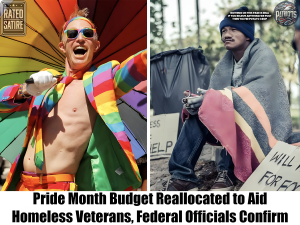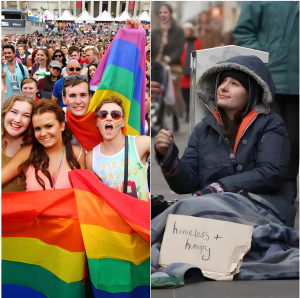Federal officials have confirmed that $6.5 million originally designated for Pride Month initiatives will now be reallocated to programs supporting homeless veterans. The move, made under the current administration, has sparked both approval and criticism, reflecting a broader debate over how best to prioritize federal funding in times of growing need.
The redirection is intended to combat the ongoing crisis of veteran homelessness, which continues to affect tens of thousands across the U.S. Data from the Department of Veterans Affairs (VA) indicates that 35,574 veterans were experiencing homelessness on a single night in January 2023—a 7.4% increase from the previous year. The reallocated funds will support established initiatives such as the HUD-Veterans Affairs Supportive Housing (HUD-VASH) program, which integrates rental assistance with clinical services and case management.

Other programs set to benefit include the Homeless Veterans’ Reintegration Program, focused on employment and job training, and the Supportive Services for Veteran Families program, which assists with rapid rehousing and homelessness prevention. Officials say the funds will help expand access to permanent housing and support services for veterans, particularly those dealing with PTSD, physical injuries, or other barriers to stability.
Proponents of the decision argue that the reallocation targets an urgent humanitarian issue, offering immediate relief to a vulnerable population. “This funding shift allows us to directly address one of the nation’s most persistent challenges,” a VA representative stated.
However, the move has also generated backlash from LGBTQ+ advocates, who see it as a setback for inclusion and equity. The Pride Month funding had previously supported mental health services, educational outreach, and healthcare access for LGBTQ+ individuals—particularly youth, who are disproportionately affected by homelessness. Studies show that LGBTQ+ youth make up nearly 40% of the nation’s homeless youth population.
Critics argue that the decision creates a false choice between supporting veterans and supporting LGBTQ+ communities. “Both groups face unique and serious challenges that warrant dedicated funding,” one advocate noted. “Redirecting resources from one marginalized group to another does not solve the broader issue of inadequate federal support.”
Administration officials have defended the move as a matter of difficult prioritization, pointing to strong bipartisan support for veteran welfare. Online reactions have been mixed, with some praising the focus on veterans, while others express concern about reduced visibility and support for Pride Month programming.

The situation highlights deeper tensions in federal budget planning, particularly when resources are limited and multiple urgent social issues compete for funding. Advocates on both sides of the debate are calling for increased investment in comprehensive support systems, rather than trade-offs that may undermine progress for one group over another.
As the reallocation rolls out, the VA has pledged transparency and accountability, with plans to monitor outcomes through its Homeless Programs Office. Meanwhile, both veteran and LGBTQ+ advocacy groups continue to push for sustainable solutions that don’t pit communities against each other, emphasizing the need for inclusive policies that serve all at-risk populations.
This shift in funding represents a pivotal moment in ongoing national conversations about equity, compassion, and the complexities of federal budget decisions.





